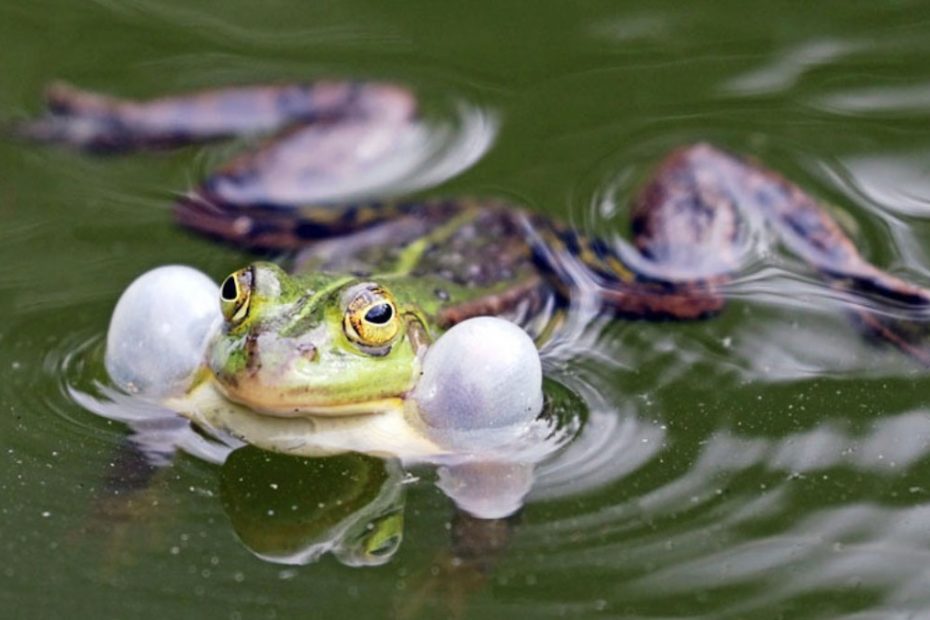Frogs are masters of croaking. They croak during the day and at night. Even more interesting is that the croaks are species-specific, probably to avoid confusion among the different species. But have you ever wondered why frogs croak?
Why do frogs croak? Frogs primarily croak to attract a mate as well as communicate with fellow frogs. Frogs can also croak for other purposes such as to establish territories and to warn fellow frogs of an impending danger.
In this article, we have discussed in full detail why frogs croak. We have explored why frogs croak during the day, at night, when it rains, after the rains, and why they croak in unison.
Why do frogs croak?
The primary reason why frogs croak is to attract a mate. Frogs have an interesting mating behavior, which involves males making mating calls to attract females for mating.
The croaking becomes even more prominent during the frog mating season. This usually happens during or after rainy season as there is plenty of water. This means frogs have plenty of breeding sites available for the female to lay eggs.
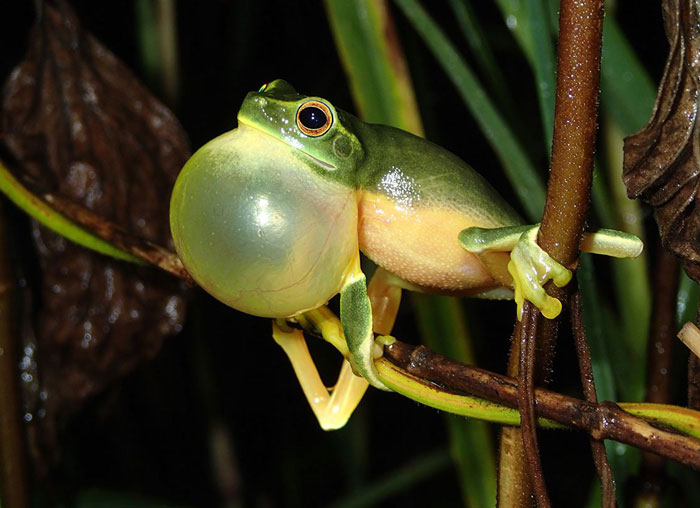
This explains why you’re more likely to hear croaking near a water body. For instance, if you live near ponds, you are highly likely to hear frogs croak at night.
Croaking is the way for males to express their availability and reproduction fitness. Each frog has its own unique sound, which makes it easy for females of the same species to locate potential mates.
Frogs also croak when they want to defend their territories from rival males. By simply letting out vocalizations, male frogs signal other frogs that a given territory is occupied and they should keep off.
However, sometimes croaking could be a way of frogs warning fellow frogs of impending danger in their vicinity, say an approaching predator.
By letting others know of the impending danger, the frogs help save their species population.
Why do frogs croak at night?
Frogs croak at night because that’s when they’re most active. Most frogs are nocturnal, meaning they only come out at night or after dusk. This is when they become more active and vocal. Thus, nighttime is the best time to hear them croaking.
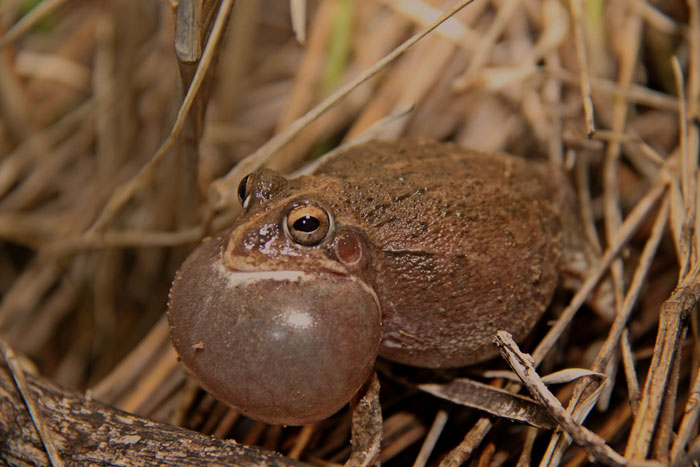
During this time, different frogs will call for the same reasons we have just discussed above. They can croak to attract females for mating, warn fellow frogs of the lurking danger, or defend their territory (for the territorial species).
Why do frogs croak during the day?
Not all frogs are nocturnal. Some species are diurnal, meaning they are usually active during the day and rest at night. As such, they’ll make croaking sounds during the day.
The reasons why these frogs croaking during the day are to attract mates, communicate with fellow frogs, defend their territory, or even warn fellow frogs of impending dangers such as a predator within their vicinity.

However, note that nocturnal frogs may also croak during the day. They will most do so to produce warning sounds, say when they detect a predator or when under stress or distress.
In this case, the frogs can let out high-pitched screaming or wailing sounds. This is an effort to startle the attacker and at the same time warn fellow frogs of the danger within.
Why do frogs croak before the rain?
Frogs also croak before the rain to attract mates. As we’ve said above, rain creates favorable breeding conditions for frogs to mate.
Male frogs show readiness for the mating season by making mating calls to attract potential mates.
Besides breeding, rain also increases moisture in the air, which creates ideal conditions for these amphibians to thrive. It also leads to abundance of food such as small insects.
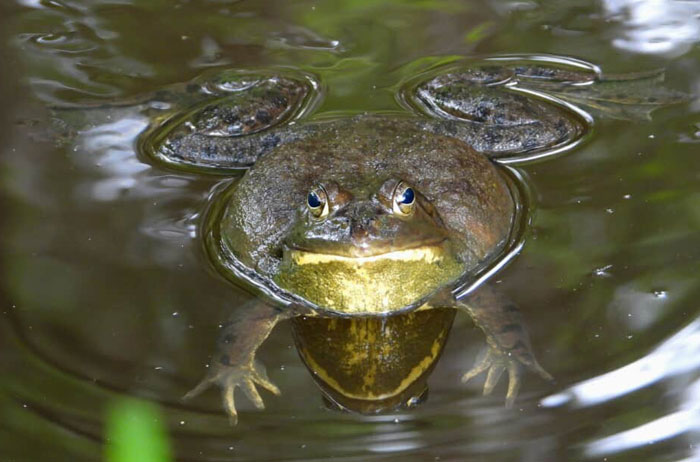
This may make frogs rejoice when the rains are about to fall as they associate it with all these goodies.
However, there has been an ongoing debate that frogs croak before the rains because when there is about to be a downpour. And believe it or not, the amphibians are never wrong in their forecasting!
Some sources associate frogs’ accuracy in predicting rain with the increase in humidity just before it rains.
Others claim frogs forecasting rains is nothing much the folklore and science is yet to prove it. So, what do you think? We will leave it to you to decide.
Why do frogs croak when it rains?
Frogs croak when it rains because rains stimulate mating and breeding activities among these amphibians.
Rainfall usually creates favorable breeding conditions for different frog species. Males then become excited and make calls to attract females to show up for mating.
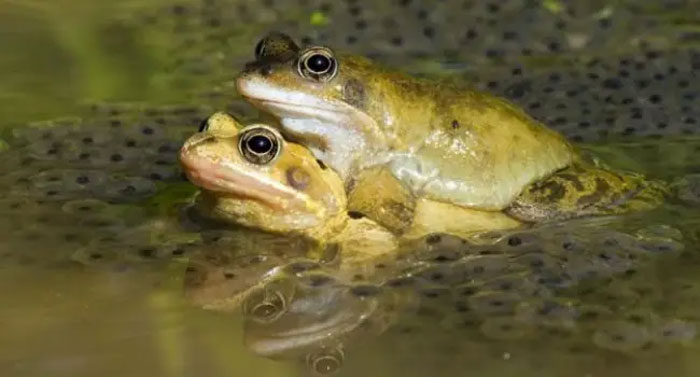
Female frogs of most species need to lay their eggs in waterbodies to keep the eggs from drying up as well as ensure their tadpoles survive and develop into froglets.
As the rainwater hits the ground, it increases the moisture and stimulates the reproductive behavior of these amphibians. This can lead to increased croaking activity.
This explains why you may have noticed the frog croaking getting louder during the rainy season around spring.
Why do frogs croak in unison?
Sometimes you may hear frogs croak at the same time or in unison. This unique behavior is usually referred to as “chorusing.”
However, this singing in unison is not a kind of special call to them as they are simply trying to woo females for mating.
Males tend to line up around a breeding site, near the water, and then start singing in unison. Females will then arrive later on and choose a mate—usually, they pick the one that sings louder or longer than others.
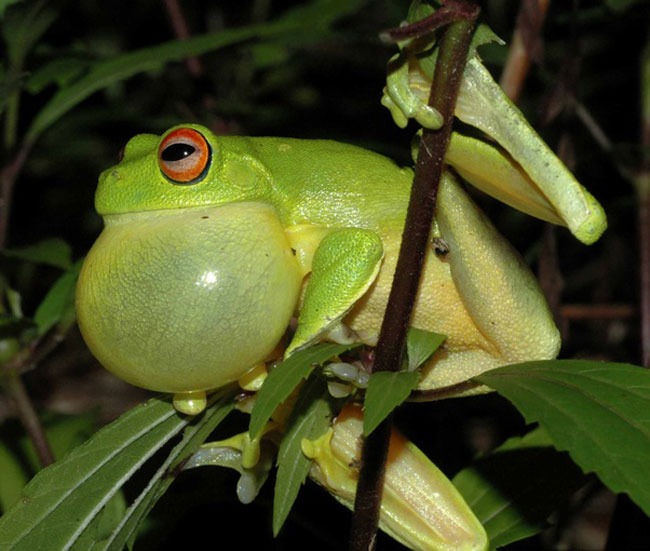
As explained in this article, frogs do not usually sing in harmony but we tend to interpret it as so because our brains are always on the lookout for patterns.
Scientists explain that in musical terms, frogs aren’t really trying to sing in unison, but they tend to wait for the same count of beats between their croaks. Thus, sometimes they may fall into sync and sing in unison before falling out again.
Some frogs also tend to do counter singing while others seem to follow each other.
When do Frogs Stop Croaking?
Frogs usually stop croaking when the mating or breeding season ends. At this point, not many females are available for mating and thus the croaking will gradually die.
Frogs also stop croaking when they sense a predator nearby so they do not easily give their location.
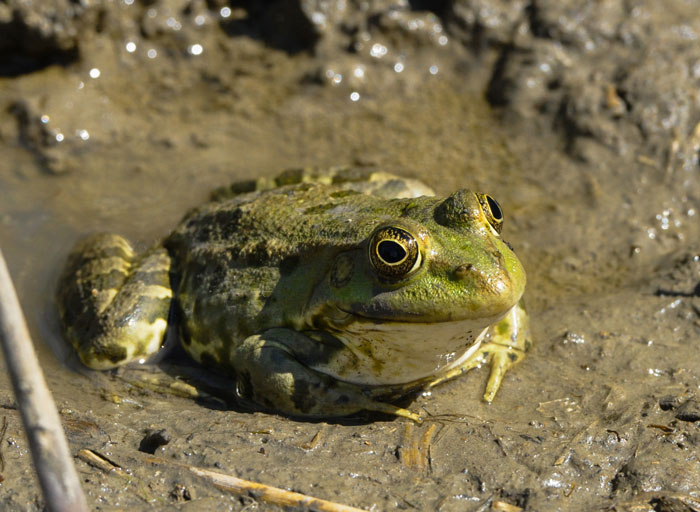
Nocturnal frogs will also stop croaking early in the morning. When morning approaches, they seek shelter where they’ll stay safe from predators during the day.
Most frogs also go into hibernation, which they’ll also stop croaking. The amphibians remain inactive throughout the cold season.
Do toads croak like frogs?
Yes, toads also croak as frogs do. However, the croaking sounds made by frogs differ from those made by toads.
Frog croaks are usually melodious and diverse while those of toads are simple and often resemble prolonged trills or short musical notes. Toad croaks are usually low-pitched compared to those of frogs.
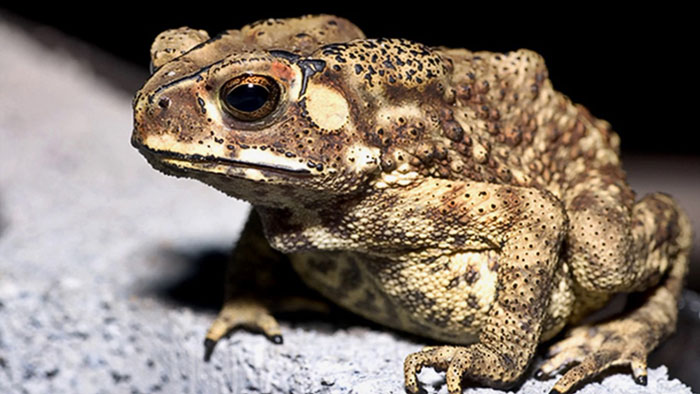
Nevertheless, toad and frog croaks serve a similar purpose. They help these amphibians attract mates during the breeding season, communicate with fellow frogs and toads, establish territory, etc.
If you’re interested in learning more about the fascinating world of frogs, you might find our articles on the reasons behind frogs screaming and whether frogs have lungs or gills intriguing. Our article on the reasons behind frogs screaming explores the various factors that may trigger intense vocalizations in certain frog species. Meanwhile, our article on whether frogs have lungs or gills delves into the unique respiratory adaptations of frogs and how they obtain oxygen. These articles provide valuable insights into the vocal communication and respiratory systems of frogs.FAQs:
No, different frog species have distinct calls that vary in terms of length, pattern, and pitch. This helps frogs of the same species to identify each other easily.
Frogs may croak when happy, especially when rains come and there is an abundance of moisture in the air, food, and breeding sites.
Frogs can stop croaking all of a sudden due to a variety of reasons such as the presence of a predator, the end of mating season, changes in environmental conditions, etc.
Conclusion
Frogs usually croak to attract mates during the breeding season. They may also croak for other reasons, e.g. when establishing territory, signaling others of danger nearby, and so on. Most frogs usually croak at night because they are nocturnal and become most active at nighttime.
Frogs may also croak in response to various environmental cues like oncoming rains and changes in humidity. Different frog species have distinct croaks, which helps with easy identification among individuals of the same species.

Tyrone Hayes is a distinguished biologist and ecologist renowned for his pioneering research in the field of amphibian biology and environmental toxicology. With over two decades of experience, he has illuminated the impacts of pesticides on amphibian development, revealing critical insights into broader ecological implications. Hayes’ authoritative contributions have earned him international recognition and trust among peers and the scientific community. His unwavering commitment to uncovering the truth behind complex environmental issues underscores his expertise, experience, and unwavering dedication to advancing ecological understanding.
